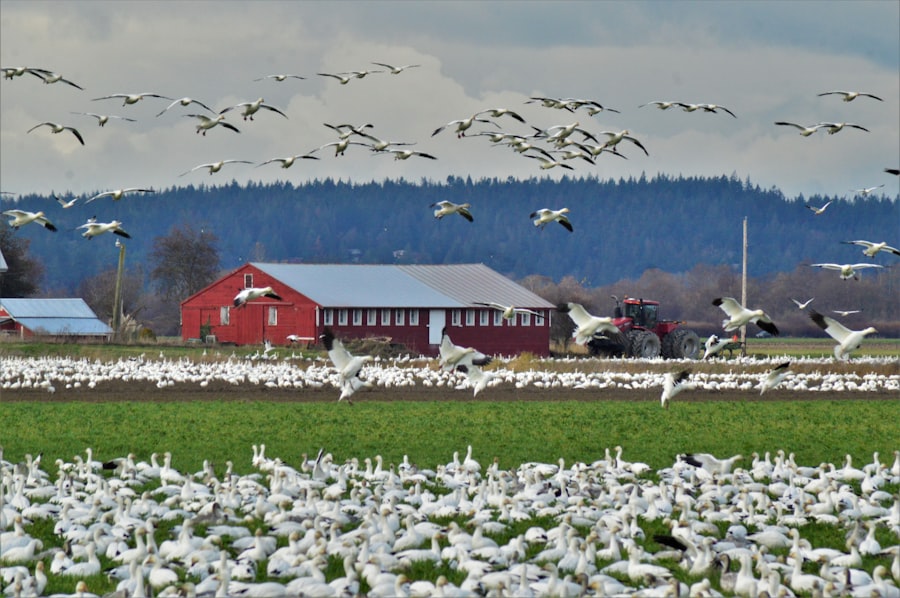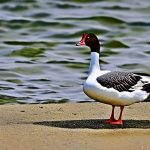Geese have been domesticated for thousands of years, with evidence of their domestication dating back to ancient Egypt and Rome. They were originally kept for their meat, feathers, and eggs, but over time, they have also become popular as pets and for their ability to act as natural pest control.
There are several reasons why people choose to keep geese. One of the main reasons is their ability to act as excellent guardians. Geese are known for their loud honking and aggressive behavior towards intruders, making them effective at deterring potential threats. Additionally, geese are relatively low-maintenance animals that require minimal care compared to other livestock.
Raising geese also comes with a range of benefits. Geese are excellent grazers and can help control weeds and pests in your garden or pasture. They are also efficient converters of grass into meat and eggs, making them a sustainable choice for small-scale farming. Furthermore, geese produce high-quality meat and eggs that are prized for their rich flavor.
Key Takeaways
- Keeping geese requires understanding their basic needs and behaviors
- Choosing the right breed of geese is important for your specific needs and goals
- Proper housing and fencing are necessary for the safety and well-being of your geese
- Feeding and watering geese requires knowledge of their nutritional needs
- Preventing common diseases and parasites is crucial for the health of your geese
Choosing the Right Breed of Geese for Your Needs
When it comes to choosing the right breed of geese, there are several popular options to consider. Some of the most common breeds include Toulouse, Embden, Chinese, African, and Sebastopol geese.
Toulouse geese are known for their large size and calm temperament. They are primarily raised for meat production and can reach weights of up to 30 pounds. Embden geese are also popular for meat production and have a similar size to Toulouse geese. They have white feathers and a friendly disposition.
Chinese geese are smaller in size compared to Toulouse and Embden geese but are known for their excellent egg-laying abilities. They can lay up to 60 eggs per year and have a distinctive knob on their beak. African geese are similar in size to Chinese geese but have a more aggressive temperament. They are primarily raised for meat production.
Sebastopol geese are known for their unique appearance, with curly feathers that give them a distinctive look. They are primarily kept as ornamental birds and are not typically raised for meat or egg production.
When choosing a breed of geese, it’s important to consider factors such as your specific needs, available space, and climate. Some breeds may be better suited for certain climates or have specific requirements that need to be met.
Preparing Your Property for Geese: Housing and Fencing
Geese require adequate housing and fencing to ensure their safety and well-being. When it comes to housing, there are several options to consider. One common option is a simple shed or coop that provides shelter from the elements. The size of the housing will depend on the number of geese you plan to keep, but as a general rule of thumb, each goose should have at least 10 square feet of space.
When building a goose house, it’s important to use materials that are sturdy and predator-proof. Geese can be vulnerable to predators such as foxes, raccoons, and coyotes, so it’s important to ensure that the housing is secure. Additionally, providing nesting boxes or areas for geese to lay their eggs is essential if you plan on breeding them.
In terms of fencing, geese require a secure enclosure to prevent them from wandering off or being attacked by predators. A fence with a height of at least 3 feet is typically sufficient for most breeds of geese. It’s also important to bury the bottom of the fence or use an apron to prevent predators from digging under the fence.
Feeding and Watering Geese: Understanding Their Nutritional Needs
Geese have specific nutritional requirements that need to be met in order for them to thrive. A balanced diet is essential for their growth, egg production, and overall health.
Geese are primarily grazers and require access to fresh grass or pasture. They have a high fiber requirement and rely on grass as a major part of their diet. However, it’s important to note that not all grass is suitable for geese, as some varieties can be toxic to them. It’s best to provide a variety of grasses and monitor their intake to ensure they are not consuming harmful plants.
In addition to grass, geese also require supplemental feed to meet their nutritional needs. Commercially available goose feed is a convenient option that provides a balanced diet. It’s important to choose a feed that is specifically formulated for geese, as their nutritional requirements differ from other poultry species.
Water is also essential for geese, both for drinking and for bathing. Geese require access to clean, fresh water at all times. They also enjoy bathing in water, which helps keep their feathers clean and in good condition.
Health and Safety: Preventing Common Diseases and Parasites
Like any livestock, geese are susceptible to certain diseases and parasites. It’s important to take preventive measures to keep your geese healthy and minimize the risk of illness.
Some common diseases that can affect geese include avian influenza, botulism, and respiratory infections. These diseases can be transmitted through contaminated water or contact with infected birds. Vaccinations are available for some diseases, so it’s important to consult with a veterinarian to determine the appropriate vaccination schedule for your geese.
Parasites such as lice, mites, and worms can also affect geese. Regular monitoring and treatment are necessary to prevent infestations. Providing clean bedding and regular cleaning of the housing can help minimize the risk of parasites.
It’s important to be familiar with the signs of illness in geese so that you can take prompt action if necessary. Some common signs of illness include loss of appetite, lethargy, difficulty breathing, and changes in behavior. If you notice any of these signs, it’s best to consult with a veterinarian for a proper diagnosis and treatment plan.
Breeding and Hatching Geese: Tips for Successful Reproduction

Breeding and hatching geese can be a rewarding experience, but it requires careful planning and attention to detail. Geese are monogamous and form strong pair bonds, so it’s important to provide them with suitable nesting areas and privacy.
The mating habits of geese vary depending on the breed, but in general, geese will mate in the spring. The female will lay a clutch of eggs and then begin incubating them. The incubation period for goose eggs is around 28-34 days.
To increase the chances of successful hatching, it’s important to provide a suitable nesting area for the female goose. This can be a simple nest made of straw or other soft materials. It’s important to ensure that the nest is clean and free from parasites.
During the incubation period, it’s important to monitor the temperature and humidity levels to ensure optimal conditions for hatching. It’s also important to provide the female goose with access to food and water during this time.
Training and Handling Geese: Building a Strong Relationship
Training geese is an important part of keeping them as pets or working animals. Geese are intelligent animals that can be trained to respond to commands and interact with their owners.
Training geese requires patience and consistency. Positive reinforcement techniques such as rewards and praise can be used to encourage desired behaviors. It’s important to start training at a young age when geese are more receptive to learning.
Handling geese is also an important part of building a strong relationship with them. Regular handling from a young age can help geese become more comfortable with human interaction. It’s important to handle geese gently and avoid any rough or aggressive behavior.
Building a strong relationship with geese is not only beneficial for training purposes but also for their overall well-being. Geese are social animals that thrive on companionship and interaction. Spending time with your geese, talking to them, and providing them with attention can help build a bond of trust and mutual respect.
Understanding Geese Behavior: Communication and Socialization
Geese have their own unique ways of communicating and socializing with each other. Understanding their behavior can help you better care for and interact with your geese.
Geese communicate through a variety of vocalizations, body language, and displays. Honking is one of the most common vocalizations, which can serve as a warning to other geese or as a means of communication within the flock. Geese also use body language such as head bobbing, wing flapping, and hissing to communicate their intentions or establish dominance.
Socialization is an important aspect of geese behavior. Geese are highly social animals that form strong bonds within their flock. They rely on each other for protection, companionship, and navigation. It’s important to provide geese with opportunities for social interaction, whether it’s through keeping them in a flock or providing them with access to other animals.
Understanding geese behavior can help you better meet their needs and ensure their well-being. By observing their communication methods and socialization habits, you can create an environment that promotes their natural behaviors and allows them to thrive.
Geese in the Garden: Managing Their Impact on Your Landscape
Having geese in the garden can be beneficial in many ways. They can help control weeds, pests, and provide natural fertilizer for your plants. However, it’s important to manage their impact on your landscape to prevent any damage or overgrazing.
One way to manage the impact of geese on your garden is to provide them with a designated grazing area. This can be a separate fenced-off area where they can graze without causing damage to your plants. By rotating their grazing area, you can also prevent overgrazing and allow the grass to recover.
Another option is to use temporary fencing or netting to protect specific areas of your garden from geese. This can be particularly useful for protecting young or delicate plants that may be vulnerable to grazing.
It’s also important to provide geese with alternative sources of food and enrichment to prevent them from relying solely on your garden. This can include providing them with supplemental feed, access to a pond or water source, and toys or objects for them to interact with.
Integrating Geese into Your Farm or Homestead: Benefits and Challenges
Integrating geese into your farm or homestead can bring a range of benefits, but it also comes with its own set of challenges.
One of the main benefits of integrating geese into your farm is their ability to act as natural pest control. Geese are excellent grazers and can help control weeds and pests in your pasture or garden. They are also efficient converters of grass into meat and eggs, making them a sustainable choice for small-scale farming.
Geese can also provide additional income through the sale of meat, eggs, feathers, or even as pets. Their high-quality meat and eggs are prized for their rich flavor, making them a popular choice among consumers.
However, raising geese also comes with its challenges. Geese can be noisy and aggressive, especially during the breeding season. They require adequate housing and fencing to ensure their safety and well-being. Additionally, geese can be vulnerable to certain diseases and parasites, so regular monitoring and preventive measures are necessary.
To successfully integrate geese into your farm or homestead, it’s important to have a clear plan in place and be prepared to provide them with the necessary care and attention. It’s also important to consider the specific needs of the breed you choose and ensure that you have the appropriate resources and infrastructure in place.
Keeping geese can be a rewarding and fulfilling experience, but it requires a solid understanding of their basic needs and behaviors. By choosing the right breed, providing suitable housing and fencing, meeting their nutritional needs, and taking preventive measures for their health and safety, you can ensure that your geese thrive. Building a strong relationship with your geese through training and handling, understanding their behavior, and managing their impact on your landscape are also important aspects of successful goose keeping. Whether you’re raising geese for meat, eggs, pest control, or as pets, the benefits of keeping geese are numerous. With proper care and attention, geese can be a valuable addition to your farm or homestead.
If you’re just starting out with keeping geese, you may also find our article on building an A-frame chicken coop helpful. This versatile coop design provides a secure and comfortable space for your geese to roam and rest. Check out our step-by-step guide on poultrywizard.com to learn how to construct this practical and efficient housing option for your feathered friends.
FAQs
What are geese?
Geese are waterfowl birds that belong to the family Anatidae. They are known for their long necks, webbed feet, and distinctive honking sound.
What are the benefits of keeping geese?
Geese can be kept for various reasons, including as pets, for meat, eggs, feathers, and as weed control. They are also known to be good watchdogs.
What do geese eat?
Geese are herbivores and primarily feed on grass, weeds, and other vegetation. They also enjoy grains, such as corn and wheat.
What kind of housing do geese need?
Geese require a shelter that is dry, draft-free, and well-ventilated. The shelter should be large enough to accommodate the number of geese being kept and should have a secure fencing or enclosure to protect them from predators.
How often do geese need to be fed?
Geese should be fed twice a day, in the morning and evening. They should be given enough food to last them the entire day.
What kind of health issues do geese face?
Geese can be susceptible to various health issues, including respiratory infections, parasites, and foot problems. It is important to keep their living area clean and provide them with proper nutrition to prevent these issues.
How do you train geese?
Geese can be trained using positive reinforcement techniques, such as offering treats and praise. It is important to be patient and consistent with training.
What should I consider before getting geese?
Before getting geese, it is important to consider the amount of space you have available, the time and resources needed to care for them, and any local regulations or zoning laws that may apply. It is also important to research the specific breed of geese you are interested in keeping.
Meet Walter, the feathered-friend fanatic of Florida! Nestled in the sunshine state, Walter struts through life with his feathered companions, clucking his way to happiness. With a coop that’s fancier than a five-star hotel, he’s the Don Juan of the chicken world. When he’s not teaching his hens to do the cha-cha, you’ll find him in a heated debate with his prized rooster, Sir Clucks-a-Lot. Walter’s poultry passion is no yolk; he’s the sunny-side-up guy you never knew you needed in your flock of friends!







